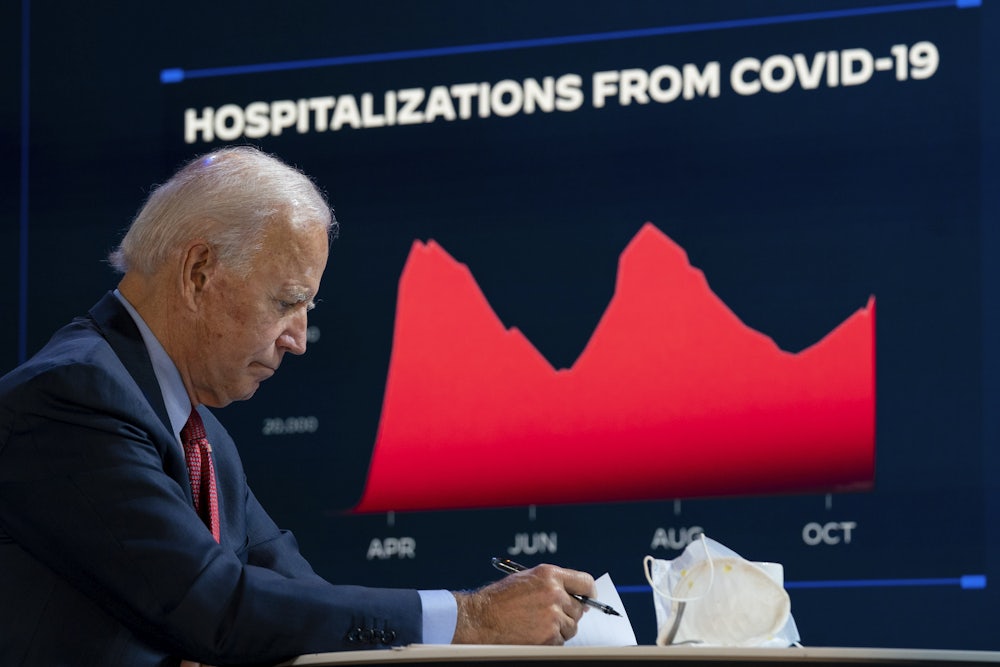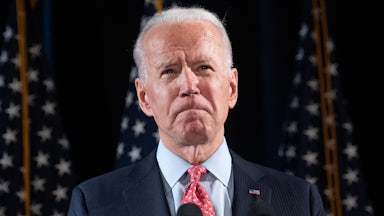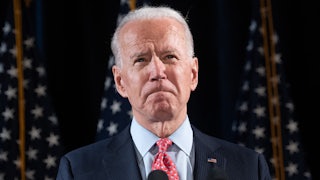It’s been three weeks since Joe Manchin effectively disemboweled the Democrats’ Build Back Better bill. A great deal has happened since then—a new Covid wave crippled the country, Christmas came and went, the anniversary of January 6 was commemorated, Kanye West and Julia Fox started dating and immediately got very weird—but fundamentally, the Democrats enter a new year more or less exactly where they were before Congress shut down for the holidays. Their legislative agenda is completely stalled out, and it’s not clear how the party’s leaders will get it unstuck.
Early signs are not especially promising. On Friday, Politico Playbook reported that President Joe Biden has begun to lean on Virginia Senator Mark Warner as a possible “Manchin whisperer.” The dilemma, per Playbook’s reporting, is more personal than political—and we are a long way away from discussing politics. Instead, Warner is being deployed to smooth things over with the West Virginia senator in the hopes that maybe—just maybe—Democrats can come together and negotiate a smaller, more targeted bill that Manchin might support. “I don’t think they’ll be able to coax him back into BBB,” the source close to Manchin told Playbook. “He’ll listen to Mark Warner, but he won’t do what he wants.”
There is still room to maneuver, however. Manchin has been fairly clear about what he doesn’t want: a bill in which programs phase out after a couple of years. There is still a glimmer of hope that he can be brought on to a package that focuses on a few things Manchin may be interested in voting for: Late last year he made a counterproposal that included, among other measures, universal pre-K, green energy funding, and an expansion of the Affordable Care Act. The question for Democrats is if they can hold their slim majorities in both houses together on Manchin’s priorities—or if embracing a new bill will just lead to the same old problems. (Kyrsten Sinema, for instance, remains a U.S. senator.)
Democrats face a similar dilemma on voting rights. Chuck Schumer has insisted that, by January 17, Democrats will either pass new voting rights legislation or reform the filibuster so they can do so. Unfortunately, at this juncture they have the votes to do neither. Republicans won’t vote for voting rights or filibuster reform, and Manchin and Sinema (at minimum) won’t vote for filibuster reform, leaving Democrats, once again, stuck in the mud. As David Dayen notes in the American Prospect, there is some bipartisan energy behind reforming the Electoral Count Act, which hasn’t been updated since 1887, but this is “clearly being put forward by Republicans as a substitute to wide-ranging voting rights legislation.”
Democrats have a third problem: They have done very little in the last few months beyond very pointedly warring with one another. During that time, the Biden administration briefly threatened to restart student loan payments, before backing down—and kicking the can down the road to the spring, when doing so would be even worse for the party’s dismal midterm prospects. It has more recently made it clear that no further Covid relief in the manner of last year’s American Rescue Plan Act will be forthcoming, despite the fact that parts of the country are effectively shut down due to the insanely infectious omicron variant. This might play into the hands of Republicans, who will have the opportunity to make the case, only somewhat disingenuously, that they did as much on this front as their rivals. Donald Trump would be a fool not to mount such an argument in 2024—though so far his nascent presidential campaign remains resolutely focused on conspiracy theories about vote-counting software, so it’s not a sure thing that he will.
Testing remains patchy and often expensive, effective masks are hard to come by, the administration is sending out half a billion at-home testing kits and modestly expanding the number of federal testing sites, but its response to the pandemic has lately degenerated into inadequacies and frustration—which is particularly bad given that responding to Covid-19 was the centerpiece of Biden’s presidential campaign.
Not all of this is the administration’s fault, of course. Republicans have effectively undermined and politicized vaccination and mediation efforts, particularly masking. But the failure in disseminating tests and other tools to fight the pandemic (along with the White House’s press secretary mocking the idea that such actions were critical) remains a stain on the administration’s record, and one that hasn’t yet adequately been resolved.
How can Democrats regain some momentum? The party needs to come together quickly on some sort of legislative agenda that can fill the Build Back Better Act–size hole left from last year’s negotiations. The more time spent spinning its wheels, the worse things will get. More importantly, Democrats need to shift the focus off their own party’s inaction, because right now Republicans are having too easy a time doing nothing.
As Barack Obama—and, for that matter, Donald Trump—found early in his period in office, executive actions may be the best option for Biden to make change that improves the lives of voters, especially given the party’s bleak midterm outlook. Nevertheless, at some point, it may become necessary for Democrats to start bringing legislation to the floor and taking tough votes—even it means that Manchin and Sinema torpedo the effort—just for the sake of midterm messaging. Democrats can’t afford to get too far into the midterms without reframing the conversation from their inability to pass an agenda to the GOP’s actual opposition to popular policies. (Given the Beltway press’s love of “Democrats in Disarray” stories, this may be a fool’s errand.)
But there’s no getting around the bare reality: Democrats have at best a few months to scrape together an argument for why they should maintain their hold on both houses of Congress. Whittling the Build Back Better Act down into a handful of priorities, like universal pre-K, is one viable option; a redoubled attention to skillfully managing the fight against the pandemic is another. The fumbles of the past year, the failures to advance critical legislation, and the foolish tactical errors on issues like restarting student loans, need to become last year’s news. Unfortunately, there’s little that suggests that a sense of urgency has emerged, and time is running out.










